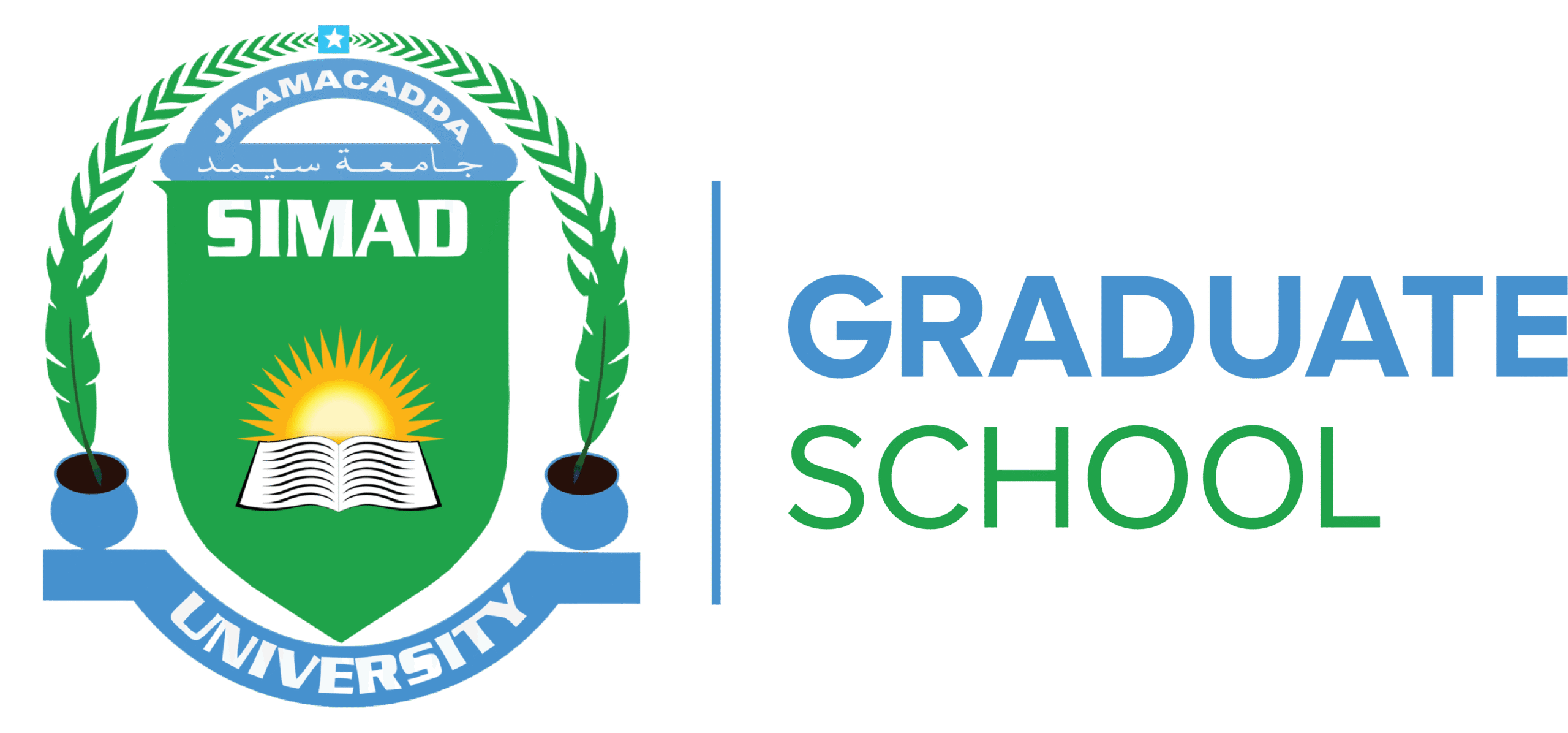Home
Programs
Master of Public Health
Master of Public Health
The Master of Public Health (MPH) at SIMAD University prepares professionals to analyze, design, and lead evidence-based responses to pressing health challenges in Somalia and comparable low-resource, post-conflict settings. Grounded in the core disciplines of epidemiology, biostatistics, research methods, health systems, and ethics/communication, the program emphasizes interdisciplinary collaboration, ethical leadership, and innovation.

Introduction
The Master of Public Health (MPH) at SIMAD University prepares professionals to analyze, design, and lead evidence-based responses to pressing health challenges in Somalia and comparable low-resource, post-conflict settings. Grounded in the core disciplines of epidemiology, biostatistics, research methods, health systems, and ethics/communication, the program emphasizes interdisciplinary collaboration, ethical leadership, and innovation. It aligns with national priorities and global frameworks, including Universal Health Coverage (UHC) and the Sustainable Development Goals—especially SDG 3 (good health and well-being). Two specialisations—Epidemiology and Health Policy & Management enable students to develop depth for roles spanning surveillance, programme design, policy analysis, service delivery, and health system governance.
Specific Objectives
By the end of the program, students will be able to:
- Build and integrate foundational knowledge across epidemiology, biostatistics, public-health ethics/communication, research methods, and health systems.
- Develop specialised competencies in either epidemiology or HealthPolicy & Management to address defined national and regional health priorities.
- Design, implement, and evaluate public-health research and programs using rigorous epidemiological and statistical methods.
- Exercise ethical leadership and policy analysis to strengthen governance, accountability, and decision-making in health services and systems.
- Translate scientific evidence into population-level prevention, health promotion, and policy solutions that support UHC and SDG targets.
Expected Learning Outcomes
Graduates will demonstrate the ability to:
– Apply epidemiologic reasoning and statistical analysis to investigate population health problems and appraise literature.
– Design methodologically sound studies; manage, analyze, and interpret quantitative/qualitative health data; and communicate findings to technical and policy audiences.
– Analyze health-system functions (governance, financing, service delivery, workforce, information) and recommend context-appropriate reforms.
– Uphold ethical principles and effective risk/health communication in research, surveillance, and emergency response.
– Plan, monitor, and evaluate public-health programs; synthesize evidence into policy briefs and implementation guidance.
Human Resources and Facilities
Faculty: Multidisciplinary academic team with expertise in epidemiology, biostatistics, research methods, environmental/occupational health, health economics/financing, health systems/governance, M&E, and public-health ethics/communication.
Learning resources: Lecture and seminar rooms; computer/statistics labs supporting SPSS/Stata/R; access to digital libraries and journals; learning management system for blended delivery.
Practice ecosystem: Linkages with ministries, hospitals, NGOs, and public-health agencies for guest teaching, data access, field projects, and supervised practicum placements
Exam Regulations
– Module assessment: Continuous assessment (assignments, presentations) + end-semester exams.
– Academic integrity: All assessments governed by university policies on originality, ethics, and conduct.
– Practicum: Based on supervisor reports, reflective logs, deliverables, and presentation.
– Thesis: Proposal approval, supervised research, dissertation, originality check, oral defense.
– Progression & remediation: Students progress upon passing prescribed modules; make-up/retake opportunities per university policy.
– Grading & GPA: GPA thresholds and degree classification per university regulations.
Award of the Degree
To be awarded the Master of Public Health (MPH), a candidate must:
- Complete core, specialization, electives, practicum, and thesis with the minimum GPA required.
- Satisfy ethical and research compliance requirements.
- Demonstrate English proficiency (B2 via Linguaskill or approved IELTS/TOEFL).
- Clear all financial and administrative obligations.
The Master of Public Health (MPH) at SIMAD University prepares professionals to analyze, design, and lead evidence-based responses to pressing health challenges in Somalia and comparable low-resource, post-conflict settings. Grounded in the core disciplines of epidemiology, biostatistics, research methods, health systems, and ethics/communication, the program emphasizes interdisciplinary collaboration, ethical leadership, and innovation. It aligns with national priorities and global frameworks, including Universal Health Coverage (UHC) and the Sustainable Development Goals—especially SDG 3 (good health and well-being). Two specialisations—Epidemiology and Health Policy & Management enable students to develop depth for roles spanning surveillance, programme design, policy analysis, service delivery, and health system governance.
Core Courses (14 CU)
Course Code | Course Title | Credit Units |
MPH 601 | Foundations of Public Health | 3 |
MPH 602 | Epidemiology for Public Health Practice | 3 |
MPH 603 | Research Methods in Public Health | 3 |
MPH 604 | Biostatistics for Public Health | 3 |
MPH 605 | Public Health Ethics and Communication | 2 |
Epidemiology Specialization (17 CU)
Course Code | Course Title | Credit Units |
EPI 611 | Principles & Methods of Epidemiology | 3 |
EPI 612 | Infectious Disease Epidemiology | 3 |
EPI 613 | Non-Communicable Disease Epidemiology | 3 |
EPI 614 | Data Management & Analysis | 3 |
EPI 615 | Environmental & Occupational Epidemiology | 2 |
EPI 616 | Field Epidemiology & Surveillance | 3 |
Health Policy & Management Specialization (17 CU)
Course Code | Course Title | Credit Units |
HPM 621 | Policy Analysis & Development | 3 |
HPM 622 | Health Economics & Financing | 3 |
HPM 623 | Health Systems Management & Governance | 3 |
HPM 624 | Monitoring & Evaluation of Health Programs | 3 |
HPM 625 | Health Law, Ethics & Policy Governance | 2 |
HPM 626 | Strategic Planning & HRM in Health | 3 |
Elective Courses (Choose any two, 4 CU total)
Course Code | Course Title | Credit Units |
MPH 606 | Global Health & Development | 2 |
MPH 607 | Mental Health & Psychosocial Support | 2 |
MPH 608 | Public Health Nutrition | 2 |
MPH 609 | Climate Change & Health | 2 |
MPH 610 | Maternal & Child Health | 2 |
Applied Components
Course Code | Course Title | Credit Units |
MPH 611 | Field Practicum/Internship | 4 |
MPH 612 | Research Thesis/Project | 6 |
Applicants are expected to meet the following:
– A bachelor’s degree in a relevant field (e.g., public health, medicine, nursing, pharmacy, laboratory sciences, statistics) from a recognized institution, normally with a strong academic record.
– Demonstrated quantitative and/or research aptitude (coursework or experience).
– A current CV, statement of purpose outlining public-health interests in the Somali/regional context, and two referees (academic or professional).
- Semester Fees: USD 533
- Tuition Fees: USD 3,200 for two years
- The school has three intakes
- January, May, September
